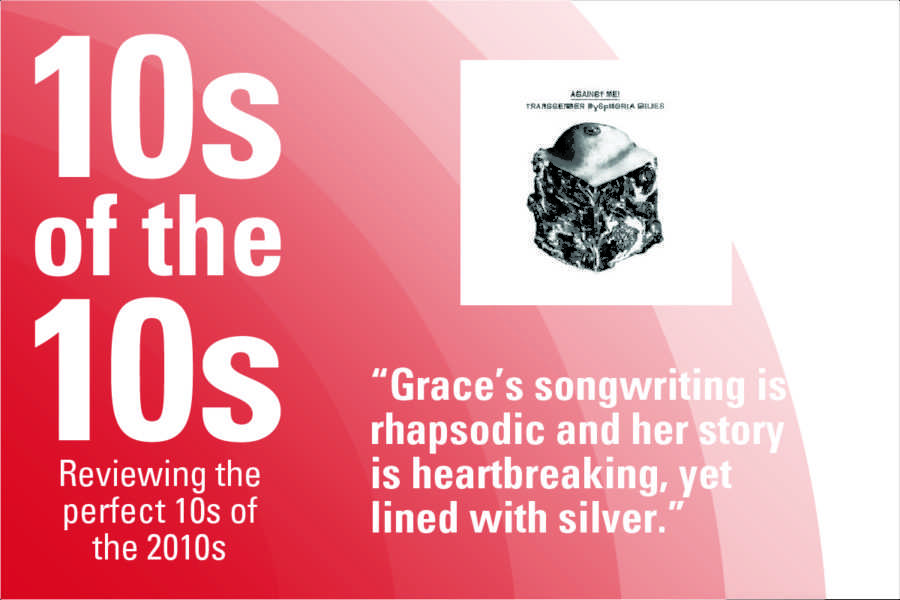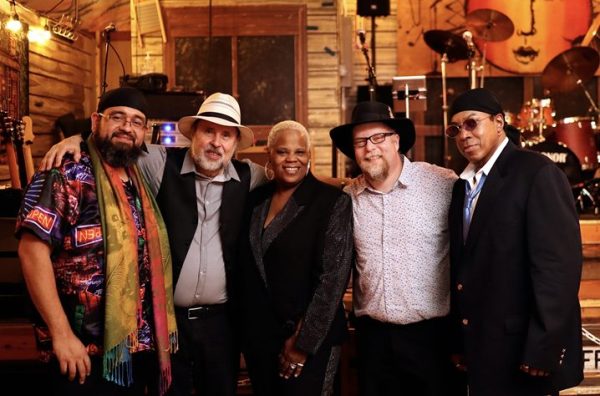10s of the 10s: Against Me!’s “Transgender Dysphoria Blues” is an emotional chronicle
Against Me!’s 2012 album “Transgender Dysphoria Blues” earns a perfect 10 for its transparent storytelling by singer Laura Jane Grace, who takes listeners through her personal journey as a transgender woman.
November 16, 2019
In 2012, the lead singer of the popular anarcho-punk band Against Me! publicly came out as a transgender woman. Loyal fans were negatively taken aback by the news and the band’s reputation began to greatly suffer.
Pressure built for Laura Jane Grace as fans turned their backs, a longtime bandmate left and her spouse filed for divorce. The future of the band grew foggier, to a point where Grace completely regretted coming out and even wondered if it was possible to stop her transition altogether.
Despite apparent catastrophe, she continued her transition as Against Me! gathered in the studio once again. It was here that frontwoman Grace told the gritty story of her journey by means of the 2014 album “Transgender Dysphoria Blues.”
Rolling Stone described the album as “A series of bracing songs about a self-destructive girl in a boy’s body.” While “bracing” may be one way to describe the record, one could also describe it as strikingly fearless.
Filled to the brim with borderline confidential details, the album is a testament to Grace’s lifelong battle with self-hatred, addiction and gender dysphoria. Grace’s songwriting is rhapsodic and her story is heartbreaking, yet lined with silver.
The album opens with the titular track, “Transgender Dysphoria Blues,” which sets the tone of the record in the most evidently narrative way. The refrain of the song is self-explanatory, but no less solemn.
“You want them to notice/ The ragged ends of your summer dress/ You want them to see you/ Like they see every other girl,” begins the chorus as an outright demonstration of how it can feel to suffer from dysphoria and how isolating it can be.
Grace’s frequent encounters with bigotry are most clearly demonstrated by the line, “They’ll hold their breath not to catch the sick.”
In her memoir titled “Tranny,” Grace said this lyric came from a specific instance in which a cashier at a clothing store quite literally appeared to hold her breath so as to not catch Grace’s “sick” when she was very early in her transition.
Grace’s memoir also explains the line, “I wish I could have spent the whole day alone with you.” The “you” in this line refers to the feminine version of herself.
In “Tranny,” Grace reveals her deeply-rooted, lifelong feeling of there being two “versions” of herself — a male and a female — battling for dominance over her body. She saw the female version as someone she would “transform” into when alone by wearing feminine clothing or makeup. Every time she did this, she would look in the mirror and wish for permanence, or to at least “spend the whole day alone with [her].”
While the opening track may be one of the most revealing songs on the album, Grace continues to impress throughout the album by detailing more of the events of her personal journey in other tracks. “True Trans Soul Rebel” is a powerful protest song about finding a sense of belonging in society; “Drinking with the Jocks” describes Grace’s way of always having felt the need to animalistically overcompensate when around other men so as to not arouse suspicion; and “Paralytic States” is a sublime elegy describing her imagination of an alternate reality in which she takes her own life due to the overwhelming dysphoria.
“Black Me Out” is the album’s roaring final track of enormous importance; it was with the live debut of this song that Grace officially announced her transition and said “good riddance” to the person she used to be. This track represents hope and new beginnings in times of regret, denial and self-hatred. It ends with a sense of triumph that makes the listener feel like they were right there beside Grace the entire time, crying for her and cheering her on as she rose from the ashes.
On top of just how hard the songs go, the kind of unparalleled emotional transparency Grace so bravely shares through them is what makes “Transgender Dysphoria Blues” a perfect 10.
About 10s of the 10s: Limelight is looking back at the best albums of the 2010s. While streaming services and viral singles have slowly withered the impact of a full length release, the best albums of the 2010s pushed boundaries, inspired new sounds and spanned a range of genres. Each album in the series is independently selected by the reviewer.

















